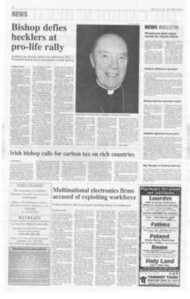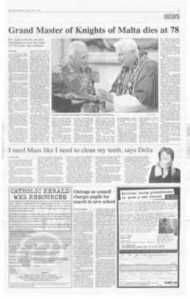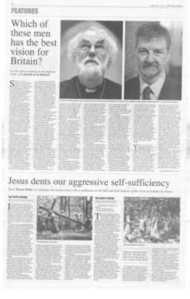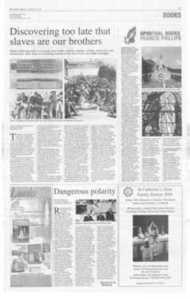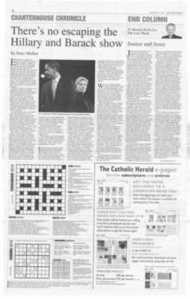Page 10, 15th February 2008
Page 10

Report an error
Noticed an error on this page?If you've noticed an error in this article please click here to report it.
Tags
Share
Related articles
Mccain Vaults For The Catholic Vote
Catholics Have Not Yet Warmed To Obama
Archbishop: I Would Deny Communion To Giuliani
Now The Democrats Are Praying For Victory
‘i Love My Church, I Respect The Bishops But Respectfully...
America's Catholics will keep the pundits guessing
No one knows which way the crucial Catholic vote will swing this time, says Freddy Gray It is often said that the Catholic vote won the election for President Bush in 2004. The theory sounds plausible, but is probably wrong. Bush's astonishing success was arguably more to do with his push towards the political middle ground in the later stages of the campaign. Then again, perhaps it was all down to the Machiavellian genius Karl Rove. who inspired his candidate to speak in code, so that the president seduced religious voters with talk about the "culture of life" while never putting off the undecided by announcing his clear intention to overturn Roe v Wade. Who knows? Maybe the Republicans just got lucky.
In 2008 the key question is not so much which candidate will gain the majority of Catholic votes, but whether Catholics will vote as a group at all. And exactly who are these Catholics anyway? The statistics are hard to pull together. Americans analyse almost everything into meaninglessness. For every study claiming the "God Gap" in American politics is growing. there is another that says it is shrinking.
Only one factor is obvious: the God vote in the United States vote is mind-blowingly complicated and endlessly paradoxical.
It is clear. however, that religion, and more specifically Catholicism, plays an important part in US elections, even if nobody knows quite what that part is. Almost a quarter of all Americans are nominally Catholic. And, thanks to the massive, uncontrolled tide of Latino immigation, their numbers are rising fast even if there is considerable debate about which Hispanics participate in the franchise. In the giant. mysterious monster that is American democracy. nothing is certain. And the greatest imponderable is which way Catholic voters are turning.
Certainly. in 2004, John Kerry's Bostonian, pm-choice pseudo-Catholicism put many devout voters off. His failure seemed to be the end of the Democratic Party's affiance with the One True Church, a union that has been perhaps stronger in public imagination than at the ballot box. True, in 1960 John F Kennedy won 80 per cent of the Catholic vote. Yet four years earlier, the Republican Dwight D Eisenhower had carried roughly half the Catholic vote.
Even the experts profess themselves completely baffled. "Catholics may be the most maddening electoral group in American politics," says Steve Wagner, a Republican consultant who specialises in Catholic voting. The political scientist David Leege writes: "Despite a cottage industry of scholars who have studied religion and politics among American Catholics, a single theory that explains the dynamics of Catholic political behaviour has eluded their grasp."
It is heart-warming for Catholics to imagine all these electoral strategists and analysts pouring over the papist demographic and coming up blank. True Catholicism is obviously above politics and does not pretend to be virtuous for political advantage, like Bill Clinton. Yet Catholics, and conservatives. do often think that their country is going to the dogs, that modern life is rubbish and godless, and that morality is in crisis. In 2004. the Republican campaign exploited this anxiety. The horror of abortion and the hope of bringing it to an end pushed Christians of all denominations towards their Methodist President. A large number of people voted for the moral issues at home instead of against policy blunders abroad.
In 2008, the mood seems different. The Democratic sweep to victory in the midterm elections of 2006 suggested that the public is sick of the war, neo-conservatism and President Bush. Although the reported success of the surge in Iraq may have restored public confidence in the US's power, the GOP's alliance with the religious Right in the name of defeating "Islamofascism" seems to have ended.
Of course, though, "the religious Right" is another meaningless abstraction. The majority of Christians in America vacillate rapidly between anger at the loonier fringes of evangelicalism and pride that their nation maintains its faith. It is hard to know in which direction they are moving.
In this electoral cycle, the presidential hopefuls, especially the Republicans, have been unsure about the kind of religious language that works. Mitt Romney presented himself as a sincere religious conservative, but he lost because he is a Mormon and, in the eyes of many on the Right, a fraud. Rudy Giuliani is Catholic, and a former seminarian, yet he likes gay marriage. war and the planet Mars: his campaign proved disastrous.
The nominee-elect John McCain's brand of bigger government and so-called compassionate conservatism is perhaps the answer to Republican prayers. In the Florida primary, for example, McCain overwhelmingly won the Catholic vote.
McCain s strategy towards Catholics appears to be a replica of the Republican ploy in 2004: start out by rallying the Right and make a late dash for the centre. But with American Christians still very nervous and depressed about the Iraq war, it seems doubtful that they will embrace a candidate who has been filmed singing "Bomb, bomb, bomb, bomb-bomb Iranto the tune of the Beach Boys' "Barbara Ann-.
McCain's relationship with religious people is still very strained. He notoriously attacked evangelicals in the 2000 primaries, and many Christians still regard him with suspicion. In recent weeks, he has tried to woo believers with pro-life noises, but his record on the issue is far from spotless. In 1993 he voted to confirm the pro-abortion liberal Ruth Bader Ginsburg on to the Supreme Court.
Then there is Mike Huckabee, whose fiery economic populism, it was thought, would appeal to Catholics. Again, however. the faithful don't seem to be voting as the pundits predicted. Huckabee's early success in Iowa owed little to Catholic support. And a widely circulated "voter alert" e-mail before the Michigan primary, warning the faithful that the Baptist minister was scarily anti-Catholic, might have harmed his chances.
Last in the Republican race is Ron Paul, a devout Protestant who doesn't speak about his faith on the stump. His forthright opposition to both war and abortion make him an attractive candidate for Christians. His wide popularity has not, however. resulted in electoral success. Furthermore, his hardline free-market philosophy may not have suited the corporatist instincts of socially minded Catholics. The consensus in the media is that the Republican Party will not be able to cobble together the same intricate coalition of Right and centre-Right, Catholic and Protestant, which brought it success in 2004. Yet the media have been wrong about almost everything so far.
On the Democratic side, with the unpopular populist John Edwards gone, Catholics are faced with the option of pro-choice Hillary Clinton or pro-choice Barack Obama. Hillary's feminist image has been cleverly softened. Her healthcare reform plans touch the hearts of many liberal Christians. But her husband's growing unpopularity and celebrated immorality raise doubts. Barack Obama inspires increasing devotion among the huge African-American Christian community. On the other hand. he is not considered. even by blacks, to be very American and, yes, in certain states his colour will harm his chances. A large proportion of Catholics may be immune to this prejudice, yet the Illinois senator's vote in favour of partial-birth abortion will obviously be held against him. That said, he is a mega star, and Americans of all faiths worship genuine charisma when they see it.
Without a Catholic nominee or any candidate who clearly represents their principles, Catholics could claim to be the most marginalised minority group in American political life. They represent such a puzzle to political strategists that they are being largely left out of electoral calculations. For many Catholics. embarrassed by the perception of their unanimity in 2004, that seems a satisfactory position. At least they will keep the experts guessing.
Freddy Gray is literary editor ofThe American Conservative
blog comments powered by Disqus



